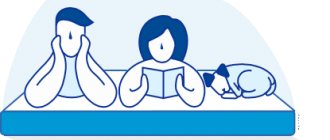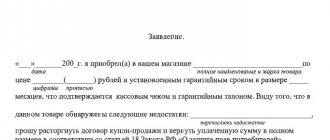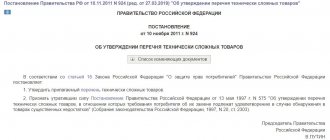The Law on the Protection of Consumer Rights establishes a whole range of measures for citizens to exercise their right to purchase quality goods. In particular, rules have been developed for the return and replacement of products in which the consumer has discovered any shortcomings.
These rules are contained in Art. 18 of Law No. 2300-1 of February 7, 1992. For their correct understanding and application in practice, the term “technically complex goods” was introduced (the list for 2020-2021 was approved by the Government of the Russian Federation). The article will provide: the current list of such products, the latest amendments made to it, the rules for returning goods with defects to the seller.
Legal assistance:
Free in Russia: 8
Dear readers!
The free legal assistance hotline is available for you 24 hours a day!
Features of returning technically complex goods
Consumer rights are regulated by the Law of the Russian Federation of 02/07/1992 N 2300-1 “On the Protection of Consumer Rights”, where Part 1 of Art. 25, which states that you can return non-food items to the store within 2 weeks after purchase, even if they are of proper quality. This is possible for any reason, including if you simply change your mind. Necessary conditions: the product has not been used, has retained its consumer properties, and you can provide a receipt or other evidence of the purchase.
Other standards are provided for technically complex goods that can only be returned if there are defects. At the same time, the legislation provides for different deadlines for delivery to the store, depending on the severity of the defect.
Full list
The list of technically complex goods in 2021 includes 14 items:
- Aircraft equipped with electric motors (internal combustion engines): light aircraft, helicopters, etc.
- Vehicles with a similar engine, including cars, motorcycles and others, intended for public roads.
- Motorized tillers, tractors, walk-behind tractors with similar types of engines.
- Vehicles for traveling on snow with the same type of engines.
- Water vehicles for sports, tourism, walking.
- Touch screen navigation and wireless communication equipment designed to perform two or more functions.
- Computers and laptops.
- MFP.
- Game consoles and kits for connecting satellite TV.
- TVs.
- Video and photo cameras.
- Watches for hand-worn and pocket watches, but only with two or more functions.
- Manual and portable electric machines.
- Kitchen and other household appliances.
List of technically complex goods
The specific list depends on the reason for which the return is required.
For minor defects
In this case, the legislation establishes a general list of goods, divided by category. According to the List established by the Government of the Russian Federation dated December 31, 2021 No. 2463, in the absence of minor defects the following cannot be returned to the store:
With significant shortcomings
According to the List approved by the Government of the Russian Federation dated November 10, 2011 No. 924, the following goods cannot be returned to the store without significant deficiencies:
The procedure for determining the degree of malfunction is also established by law. According to the preamble of the Health Protection Regulation, a deficiency is considered significant if it corresponds to one of the following criteria:
- is irreducible;
- correction requires costs or time disproportionate to the defect itself;
- is detected repeatedly or appears again after elimination.
Procedure and timing of inspection of technically complex goods
Product warranty period
When the seller is right to refuse a refund for the goods
The store has the right to refuse to accept the device and pay the client money if the product is sold of proper quality, has a warranty period established by the manufacturer and is a complex technical device.
You cannot return the device or exchange it for a similar one if:
- I don’t like the color, the sizes don’t fit;
- the defect was discovered 15 days or more from the date of purchase;
- the equipment was transferred to the service center for repair under warranty and the period did not exceed 45 days;
- During the warranty period, the service center had to be contacted no more than twice.
The biggest debate is whether a particular model is a complex device. For example, you won’t be able to hand over a TV or a built-in microwave oven; they are on the list. But you can try to argue about a hairdryer, range hood, iron or free-standing microwave.
Warranty repair and service life
Like any product, technically complex purchases are subject to a warranty period - a period during which you can count on free repairs.
This time is set by the seller or the buyer and is communicated to the buyer in writing (Article 10 of the PZPP).
If the warranty period is not established, in accordance with clause 2, part 1 of art. 19 ZPPP, it is 2 years. Calculation begins from the moment the goods are transferred to the buyer, and if it cannot be determined, from the date of manufacture.
In addition to the warranty period, the law also establishes the service life of the product, and you can make quality claims within this time. This time is calculated from the moment the product is manufactured until the date by which it is fit for use.
It happens that the warranty period established by the seller or manufacturer is less than 2 years. In this case, if defects are discovered after the expiration of the warranty period, but no later than 24 months after purchase, the right to make claims is retained (Part 5 of Article 19 of the PZPP).
What products cannot be returned to the online store?
Citizens are increasingly purchasing necessary things via the Internet.
You cannot return to the online store:
- Things that have individually defined characteristics and cannot be sold to another buyer - clause 4 of Art. 26.1 STD. For example, you ordered shoes or clothes according to your measurements via the Internet, or asked to put the inscription you need on the product. Such a product cannot be returned.
- Food products, if the consumer has no complaints about their quality.
- Products marked refurbished (no returns or no refunds) purchased through foreign online stores.
When an item in a photograph does not look the same as in reality, or the description does not match the reality, you can return it, even if it is included in one of the above lists.
The buyer cannot always prove that he expected to receive something different. Therefore, it is better to take screenshots of internet pages with photos and descriptions to refer to inconsistencies. If the dispute is considered in court, the documents will need to be notarized.
Repair time
When transferring the TST for repair, an agreement is drawn up indicating the time frame within which the deficiencies must be eliminated. If this period is not established, the time for restoration work cannot exceed 45 days (Part 1 of Article 20 of the Civil Code). If during the repair it turns out that the repair cannot be completed within the agreed time frame, the parties may enter into an additional agreement establishing a new time frame.
It is important to consider here that the lack of spare parts, equipment and other parts necessary for repairs is not a reason to increase its time.
If we are talking about a durable product, the seller is obliged to provide a similar product for the period of repair (Part 2 of Article 20 of the Labor Code). This is done strictly at the buyer’s request within 3 days after its presentation.
The warranty period during the repair period is suspended and resumed after the goods are delivered to the buyer. If components have been replaced, a new warranty period is established for them (Part 4, Article 20 of the Labor Code).
If the item breaks again
If there is a repeated breakdown, you can demand to cancel the sales contract and return the money, as well as exchange the product for a similar or different one with a recalculation of the cost.
What a consumer needs to know when purchasing a technically complex household product
7:48, December 5, 2021, Consumer Market
It is difficult to imagine the life and leisure of a modern person without the use of technically complex goods.
Trading enterprises offer consumers a wide range of technically complex goods, represented by a variety of brands and models that have both similar and significantly different technical characteristics and price limits.
We offer for consideration several main points that we recommend paying attention to when purchasing technically complex goods.
Which product is classified as a technically complex product?
In accordance with Article 18 of the Law of the Russian Federation dated 02/07/1992 No. 2300-1 “On the Protection of Consumer Rights” (hereinafter referred to as the Law), the Government of the Russian Federation approved the List of technically complex goods (Resolution of the Government of the Russian Federation dated 11/10/2011 No. 924 “ On approval of the list of technically complex goods").
The list includes the following types of goods:
1. Light airplanes, helicopters and aircraft with an internal combustion engine (with an electric motor).
2. Passenger cars, motorcycles, scooters and transport
vehicles with an internal combustion engine (with an electric motor) intended for driving on public roads.
3. Tractors, walk-behind tractors, motor-cultivators, machines and equipment for agriculture with an internal combustion engine (with an electric motor).
4. Snowmobiles and vehicles with an internal combustion engine (with an electric motor) specifically designed for driving on snow.
5. Sports, tourist and pleasure vessels, boats, boats, yachts and transport watercraft with an internal combustion engine (with an electric motor).
6. Navigation and wireless communications equipment for home use, including satellite communications, having a touch screen and having two or more functions.
7. System units, stationary and portable computers, including laptops, and personal electronic and computing machines.
8. Laser and inkjet multifunctional devices, monitors with a digital control unit.
9. Satellite television sets, game consoles with a digital control unit.
10. TVs, projectors with a digital control unit.
11. Digital photo and video cameras, lenses for them and optical photo and film equipment with a digital control unit.
12. Refrigerators, freezers, washing machines and dishwashers, coffee machines, electric and combined stoves, electric and combined ovens, air conditioners, electric water heaters with an electric motor and (or) microprocessor automation.
13. Mechanical, electronic-mechanical and electronic wrist and pocket watches, with two or more functions.
14. Electrified tools (hand and portable electric machines).
Features of selling technically complex goods
In accordance with Decree of the Government of the Russian Federation dated January 19, 1998 No. 55, the Rules for the sale of certain types of goods were approved, which provide for the following features of the sale of technically complex goods (hereinafter referred to as the Rules).
1. Before being delivered to the sales floor or to the point of delivery of purchase, technically complex household goods must undergo pre-sale preparation, which includes: unpacking the goods, removing factory grease, dust, shavings; inspection of the goods; checking the completeness, quality of the product, the availability of the necessary information about the product and its manufacturer; if necessary, assembly of the product and its adjustment.
Samples of goods offered for sale must be placed on the sales floor and have labels indicating:
— names, brands, models, articles;
— product prices;
- a brief summary containing its main technical characteristics.
2. At the buyer’s request, he must be familiar with the structure and operation of the goods, which must be demonstrated in assembled, technically sound condition. Products that do not require special equipment for connection are shown in working condition. The person carrying out the sale, at the request of the buyer, checks in his presence the quality of the goods, its completeness, the availability of documents related to it, and the correctness of the price.
The person carrying out the sale, at the request of the buyer, checks in his presence the quality of the goods, its completeness, the availability of documents related to it, and the correctness of the price.
3. When transferring technically complex household goods to the buyer, the set of accessories and documents installed by the manufacturer of the goods (technical passport or other document replacing it indicating the date and place of sale, operating instructions and other documents) are simultaneously transferred to the buyer.
4. Along with the goods, the buyer is also given a sales receipt, which indicates the name of the goods, model, brand, price of the goods, date of sale, surname and signature of the person carrying out the sale.
The seller or an organization performing the functions of the seller under an agreement with him is obliged to assemble and (or) install (connect) at the buyer’s home a technically complex product, the independent assembly and (or) connection of which by the buyer in accordance with mandatory requirements or technical documentation attached to the product (technical data sheet, operating instructions) is not allowed.
The seller is obliged to bring information about the organizations performing the specified work to the attention of the buyer when selling goods.
REMEMBER! If the cost of assembly and (or) installation of the product is included in its price, then the specified work must be performed by the seller or the relevant organization free of charge.
It is important to know that in relation to a technically complex product, the consumer, if defects are discovered in it, has the right to refuse to fulfill the sales contract and demand a refund of the amount paid for such a product or make a demand for its replacement with a product of the same brand (model, article) or the same product of a different brand (model, article) with a corresponding recalculation of the purchase price within fifteen days from the date of transfer of such product to the consumer.
After this period, these requirements must be satisfied in one of the following cases:
detection of a significant defect in the product;
violation of the deadlines established by law for eliminating product defects;
the impossibility of using the product during each year of the warranty period in total for more than thirty days due to repeated elimination of its various deficiencies.
NOTE! Often, all the consumer qualities of a technically complex product are demonstrated to the consumer in a store on display copies of the product.
Then, when the consumer pays for the goods, the goods are taken out of the warehouse in packaging. In response to the buyer’s demands to open the purchased product and check its consumer properties, the sellers explain to the buyer that he can carry out this action independently at home, and if any shortcomings are identified in the product, contact the store.
It is imperative to check the purchased product for any external defects - scratches, chips, packaging, etc.
What information for consumers
must be provided by the seller when selling the goods
In accordance with Article 10 of the Law, the seller is obliged to promptly provide the consumer with the necessary and reliable information about goods (works, services), ensuring the possibility of their correct selection.
Information about goods (works, services) must necessarily contain:
the name of the technical regulation or other designation established by the legislation of the Russian Federation on technical regulation and indicating the mandatory confirmation of the conformity of the product;
information about the basic consumer properties of goods (works, services)
price in rubles and conditions for the purchase of goods (work, services), including when paying for goods (work, services) a certain time after their transfer (performance, provision) to the consumer, the full amount payable by the consumer, and the repayment schedule for this amount;
warranty period, if established;
rules and conditions for the effective and safe use of goods (works, services);
information on the energy efficiency of goods for which the requirement for such information is determined in accordance with the legislation on energy saving and increasing energy efficiency;
service life or shelf life of goods (work) established in accordance with this Law, as well as information about the necessary actions of the consumer after the expiration of the specified periods and possible consequences for failure to perform such actions, if the goods (work) after the expiration of the specified periods pose a danger to life, health and property of the consumer or become unsuitable for intended use;
address (location), corporate name (name) of the manufacturer (performer, seller), authorized organization or authorized individual entrepreneur, importer;
information on mandatory confirmation of compliance of goods (works, services) with the legislation of the Russian Federation on technical regulation
information on the rules for the sale of goods (performance of work, provision of services);
an indication of the specific person who will perform the work (provide the service), and information about him, if this is relevant, based on the nature of the work (service);
If the product purchased by the consumer has been used or the defect(s) have been corrected, the consumer must be provided with information about this.
Information is brought to the attention of consumers in the technical documentation attached to the goods (works, services), on labels, markings or other documents attached to the goods.
Information on mandatory confirmation of conformity of goods is presented in the manner and in the ways established by the legislation of the Russian Federation on technical regulation, and includes information about the number of the document confirming such conformity, its validity period and the organization that issued it.
If the purchased product has been used or a defect has been corrected, the buyer must be provided with information about this.
The seller must warn the buyer about existing shortcomings not only orally, but also in writing (on the product label, sales receipt or other means).
Responsibility of the manufacturer (seller)
for inappropriate information about the product
In accordance with Article 12 of the Law, if the consumer is not given the opportunity to immediately obtain information about the product upon concluding a contract, he has the right to demand from the seller compensation for losses caused by unjustified avoidance of concluding the contract, and if the contract is concluded, to refuse to fulfill it within a reasonable time and demand refund of the amount paid for the goods and compensation for other losses.
If the consumer refuses to fulfill the contract, he is obliged to return the goods to the seller.
A seller who does not provide the buyer with complete and reliable information about the product bears responsibility under paragraphs 1 - 4 of Article 18 of the Law for defects in the product that arise after its transfer to the consumer due to the lack of such information.
If harm is caused to the life, health and property of a consumer due to failure to provide him with complete and reliable information about a product, the consumer has the right to demand compensation for such harm in the manner prescribed by Article 14 of the Law, including full compensation for losses caused to natural objects owned (possessed) consumer.
When considering consumer claims for compensation for losses caused by unreliable or insufficiently complete information about a product (work, service), it is necessary to proceed from the assumption that the consumer does not have special knowledge about the properties and characteristics of the product.
Product quality
The seller is obliged to transfer to the buyer the goods of proper quality, in containers and (or) packaging, with the exception of goods that by their nature do not require packaging and (or) packaging, in a certain set (set of goods) and completeness, with documents and accessories related to the goods.
Requirements for the quality, container and (or) packaging of the transferred goods, their completeness, accessories and documentation, set of goods, as well as the conditions for delivery of goods are established by the legislation of the Russian Federation.
If there are no conditions in the contract regarding the quality of the goods, the seller is obliged to deliver goods that meet the usual requirements and are suitable for the purposes for which goods of this kind are usually used.
If the seller, when concluding the contract, was informed by the consumer about the specific purposes for purchasing the goods, the seller is obliged to transfer to the consumer the goods suitable for the purposes of use in accordance with these purposes.
When selling a product based on a sample and description, the seller is obliged to transfer to the consumer a product that matches the sample and (or) description.
If laws or the procedure established by them provide for mandatory requirements for the product. The seller is obliged to deliver goods that meet these requirements.
Consumer rights
when defects are discovered in a technically complex product
In accordance with Article 18 of the Law, the consumer, in the event of detection of defects in the product, if they were not specified by the seller, has the right, at his choice:
demand replacement with a product of the same brand (same model and (or) article);
demand replacement with the same product of another brand (model, article) with a corresponding recalculation of the purchase price;
demand a proportionate reduction in the purchase price;
demand immediate free elimination of defects in the goods or reimbursement of costs for their correction by the consumer or a third party;
refuse to fulfill the purchase and sale agreement and demand a refund of the amount paid for the goods. At the request of the seller and at his expense, the consumer must return the defective product.
In this case, the consumer also has the right to demand full compensation for losses caused to him as a result of the sale of goods of inadequate quality.
In relation to a technically complex product, if defects are discovered in it, the consumer has the right to refuse to fulfill the purchase and sale agreement and demand a refund of the amount paid for such a product or make a demand for its replacement with a product of the same brand (model, article) or with a different product. brand (model, article) with a corresponding recalculation of the purchase price within fifteen days from the date of transfer of such goods to the consumer. After this period, these requirements must be satisfied in one of the following cases:
detection of a significant defect in the product;
violation of the deadlines established by this Law for eliminating product defects;
impossibility of using the product during each year of the warranty period for a total of more than thirty days due to repeated elimination of its various deficiencies
The Law defines a significant defect in a product as an irreparable defect or defect that cannot be eliminated without disproportionate costs or time, or is detected repeatedly, or appears again after its elimination, or other similar defects.
If defects in the product are identified, you must contact the seller with a written complaint, which sets out your requirements. The claim is written in two copies, one of which is handed over to the seller, and on the other copy a mark is placed that the seller accepted the claim, indicating the position and full name of the person who received the claim. If the seller refuses to accept the claim, it must be sent by registered mail to the legal or actual address of the enterprise, with notification.
The consumer's absence of a cash or sales receipt or other document certifying the fact and conditions of purchase of the goods is not grounds for refusal to satisfy his requirements.
The seller (manufacturer), authorized organization or authorized individual entrepreneur, importer are obliged to accept goods of inadequate quality from the consumer and, if necessary, carry out a quality check of the goods. The consumer has the right to participate in checking the quality of the product.
In the event of a dispute about the reasons for the occurrence of defects in the goods, the seller (manufacturer), an authorized organization or an authorized individual entrepreneur, or the importer are obliged to conduct an examination of the goods at their own expense. The consumer has the right to be present during the examination of the goods and, in case of disagreement with its results, to challenge the conclusion of such examination in court.
If, as a result of the examination of the goods, it is established that its defects arose due to circumstances for which the seller (manufacturer) is not responsible, the consumer is obliged to reimburse the seller (manufacturer), an authorized organization or an authorized individual entrepreneur, the importer for the costs of conducting the examination, as well as those associated with its implementation. costs of storing and transporting goods.
The seller (manufacturer), authorized organization or authorized individual entrepreneur, importer is responsible for defects in goods for which there is no warranty period, if the consumer proves that they arose before the transfer of the goods to the consumer or for reasons that arose before that moment.
Elimination of product defects by the manufacturer (seller, authorized organization or authorized individual entrepreneur, importer)
In accordance with Article 20 of the Law, if the period for eliminating defects in a product is not determined in writing by agreement of the parties, these defects must be eliminated by the manufacturer (seller, authorized organization or authorized individual entrepreneur, importer) immediately, that is, within the minimum period objectively necessary for their elimination taking into account the commonly used method. The period for eliminating defects in the goods, determined in writing by agreement of the parties, cannot exceed forty-five days.
If, during the elimination of defects in the product, it becomes obvious that they will not be eliminated within the period specified by agreement of the parties, the parties may enter into an agreement on a new period for eliminating the defects of the product. At the same time, the absence of spare parts (parts, materials), equipment necessary to eliminate defects in the goods, or similar reasons, do not constitute grounds for concluding an agreement on such a new period and do not exempt from liability for violating the period initially determined by agreement of the parties.
In relation to durable goods, the manufacturer, seller or authorized organization or authorized individual entrepreneur is obliged, upon presentation by the consumer of the specified requirement, within three days, to provide the consumer free of charge for the repair period with a durable product that has the same basic consumer properties, ensuring delivery at his own expense.
If the store refuses to accept a technically complex product
If the seller does not want to accept the goods, you need to:
- Write a pre-trial claim to the store. The waiting period for a response is 30 days.
- File a complaint with Rospotrebnadzor. The waiting period is 30 days. This is an optional stage; after the claim, you can immediately go to court.
- Filing a claim. In this case, you can receive not only compensation for the cost of the goods, but also a penalty in the amount of 1% of the cost of the goods and compensation for moral damages in the amount established by the court. If you carried out the examination at your own expense, the costs for it will also be reimbursed.
When can you return, change a refrigerator, TV or other appliance and take your money back?
Every buyer can take advantage of this opportunity in the following cases:
- The defect was discovered within 14 days of the date of purchase. In this situation, you can demand that the device be replaced with a similar one from a different manufacturer, with a recalculation of the cost, or withdraw money.
- If the repair period under warranty exceeded 45 days.
- During the warranty period, significant deficiencies were identified.
- Due to systematic breakdowns, you cannot use the equipment for more than 30 days during each calendar year while the warranty is valid.
In the last three cases, the consumer can write an application for payment of the cost, replacement or compensation for losses due to the sale of products with manufacturing defects.
Possibility of returning certain products
Despite the fact that the law establishes a specific list of technically complex goods, disputes often arise about the possibility of returning individual items of purchase. Let's give a few examples.
- iron - can be returned if there are minor defects within 15 days after purchase;
- cell phone - you can return it in the first 2 weeks, even if it is in good condition, although many sellers try to classify it as clause 11 of the TST List;
- robot vacuum cleaner - only return it for repair if there is a significant defect and during the warranty period or service period;
- microwave oven - possible if it is not built-in;
- watches - only for repairs within the warranty period.
FAQ
Q: Is it possible to return a purchase without a receipt?
A: The absence of a receipt is not a basis for refusal to satisfy the consumer’s requirements - clause 5 of Art. 18, art. 25 ZPPP.
Q: Is it possible to return fur products?
A: Fur products can be returned to the store both if they are of proper quality and if defects are detected.
Q: Can bedding/supplies be returned?
A: If the bed linen is of poor quality, it can be returned. But a blanket or pillow can be returned, even if the buyer has no complaints about its quality. But only if they have not been used and the product’s presentation is preserved.
Q: Can I return furniture to the store?
A: Yes, if it is not a furniture set or set.
Arbitrage practice
Let's look at an example from judicial practice:
The Zarechensky City Court of the Penza Region considered case No. 2-479/2017 in which the plaintiff made demands for a refund for a product that he bought on the website, but picked up at the Megafon office on his own, without opening the box and without checking the purchase.
After returning home, the plaintiff discovered that he was not satisfied with certain technical characteristics that could not be determined when purchasing online. In this regard, a claim for a refund was sent to the store, but it was refused.
Having considered all the circumstances of the case, the court decided to recover from the defendant in favor of the plaintiff:
- cost of goods;
- penalty for each day of delay in fulfilling the buyer’s requirements;
- compensation for moral damage.
When a buyer's demands may be refused
Based on established judicial practice, here is a list of circumstances under which buyers will be denied satisfaction of their claims:
- The defects were caused by the buyer and are not manufacturing defects . Thus, the buyer demanded that the store carry out free warranty repairs on the Apple iPhone. But the examination showed that the shortcomings arose due to mechanical damage to the body. The court rejected the claim because the consumer violated the operating rules. In a similar case, the court refused to repair the car free of charge, since the defect was not production-related.
- The buyer did not provide evidence that the product was defective . So, the buyer handed in the tablet for inspection, indicating that it would not turn on. But after resetting the user settings at the service center, the product turned out to be technically intact. Therefore, the buyer's demands were refused.
- The defect of the goods is not significant . For example, a buyer purchased a camera and requested a replacement product outside of 15 days. The court concluded that the manufacturing defect could be eliminated without significant financial costs and was not significant.
- The company made a demand on the basis of consumer rights protection . If the product is used by an individual entrepreneur or a legal entity, then they cannot refer to the Law on the Protection of Consumer Rights.
Lawyer's answers to private questions
I bought a navigator for my car, but after 3 days I realized that it was better to purchase it complete with a DVR. I took the purchase to the store to arrange an exchange with an additional payment, but they refused. What to do?
The navigator is a technically complex product that can be returned only if there are defects: within 15 days if they are minor and returned for free repair if more time has passed. The fact that you changed your mind about the purchase is not a reason to return the product, so the seller is right.
We purchased a pumping station for our dacha, but it only worked for one day. The store refuses to issue a return, they say they will send it for examination. What should I do?
File a pre-trial claim demanding the return of funds, then go to court. This can be done immediately or wait for the results of the examination.
I bought bed linen as a gift, but the birthday girl didn’t like the material. The seller says that this is a technically complex product and refuses to change it. He is right?
The TST list does indeed include textiles, but we are talking about goods that are sold by the meter. The kit is not included in this category, so write a claim and file a lawsuit.
Is a modem a technically complex product? I want to return the money, but I'm worried that the seller will refuse to accept it back.
The modem is not included in the TST category, so you can return it to the seller, provided that no more than 14 days have passed, the product has not been used and has retained its consumer properties.
Can I return the hairdryer to the store if I change my mind about buying it?
No, it is included in the list of technically complex products, so you can only return it if it is faulty. If the defect is minor, you can make an exchange or return within 15 days. If the breakdown is serious or more time has passed, only free repairs under warranty.
In what cases can a consumer return an item included in one of the lists?
The inclusion of certain categories of products in the lists of goods that cannot be returned or exchanged is most often due to the fact that their further sale may be impossible or unsafe.
If a purchase is on one of the lists, you can refuse it when:
- The thing has defects - Art. 503 Civil Code of the Russian Federation, art. 18 ZPPP.
- The seller did not provide information about the product or the warranty period/service life - Art. 469 Civil Code of the Russian Federation, art. 4, , 12 ZPPP.
Important! Complex technical goods purchased remotely and free of defects can be returned to the seller in accordance with Art. 26.1 STD.
See also:
How to return jewelry to a store in 2021 - step-by-step instructions
How to return furniture under the consumer protection law in 2021 - step-by-step instructions
How to return a watch legally in 2021 - detailed review and instructions
Is it possible to return medical products?
Medical products included in the list of goods that cannot be returned include:
- Medications.
- Medical products - instruments, devices, instruments, equipment, materials used for medical purposes - Art. 38 Federal Law “On the fundamentals of protecting the health of citizens in the Russian Federation.”
- Sanitation and hygiene items - rubber, metal, etc.
- Oral hygiene products.
- Spectacle lenses.
- Child care items.
The inclusion of medical goods in the above list is due to the fact that the pharmacist cannot know for sure whether the products being returned are original. What if this is a good quality fake, the sale of which to another citizen could cause him harm or even death.
Returns and replacements for products purchased at a pharmacy are possible in the following cases:
- The above conditions regarding the quality of the purchase and the provision of information about the product/manufacturer are not met.
- There was an error by the pharmacist in the name of the drug, in its form or dosage - clause 2 of Art. 469 Civil Code of the Russian Federation, paragraph 3 of Art. 4 STD.
Is it possible to return household appliances to the store?
Technically complex goods that are not subject to return or exchange include the following household appliances:
- Refrigerators and freezers, including combined ones.
- Automatic washing machines and dishwashers.
- Machines designed for drying clothes, as well as washing and drying machines.
- Food processors and coffee machines.
- Hobs and ovens, various types of cookers.
- Built-in microwave ovens.
- Robot vacuum cleaners.
- Air conditioners.
- Electric water heaters.
As follows from the presented list, an ordinary vacuum cleaner, hair dryer or iron is not a technically complex product. Accordingly, such items are subject to the buyer’s requirement for an exchange or refund, even if the product is of high quality.
In this case, the warranty period for such a purchase should be less than a year. Otherwise, its replacement will be possible only if there is a defect.
Important! PPRF dated December 31, 2020 No. 2463 approved the Rules for the sale of certain types of goods, including technically complex ones. An annotation for technically complex goods, in accordance with clause 38 of the rules, must contain its main characteristics.
See also:
How to return household appliances to the store in 2021 - step-by-step instructions
Is it possible to return food products?
Products cannot be returned if the buyer has no complaints about their quality. When purchasing such goods, a retail purchase and sale agreement is not concluded. Therefore, citizens should pay attention to what information is contained on the packaging.
In accordance with Art. 3 of the Federal Law “On the quality and safety of food products” the following products are recognized as low-quality and cannot be sold:
- Not marked.
- Without indicating information about how long the product can be consumed.
- Expired.
- The safety and quality of which are not confirmed by relevant documents.
The labeling must contain the following information - Technical Regulations of the Customs Union “Food products regarding their labeling”:
- Product name, composition and nutritional value of the product.
- Quantity of product.
- Date of manufacture of food products and the period by which they must be consumed.
- Storage conditions - including open packaging, if this affects the quality and safety of the product.
- Manufacturer information.
- Recommendations for use/preparation - if the absence of such recommendations would make it difficult to use the product or could cause harm to a citizen.
- Information about the presence of GMOs in the product.
- A single mark for the circulation of products on the market of member states of the Customs Union.
You can return products if:
- The product does not contain the above information.
- The packaging is damaged - its integrity is compromised.
- The expiration date has expired.
- Upon inspection of the goods, clear signs of its improper appearance/contents were revealed.






